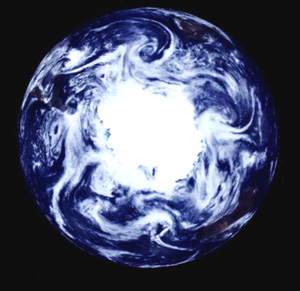|
In a profoundly pessimistic new assessment, published in today's Independent, Professor Lovelock suggests that efforts to counter global warming cannot succeed, and that, in effect, it is already too late.
The world and human society face disaster to a worse extent, and on a faster timescale, than almost anybody realises, he believes. He writes: "Before this century is over, billions of us will die, and the few breeding pairs of people that survive will be in the Arctic where the climate remains tolerable."
In making such a statement, far gloomier than any yet made by a scientist of comparable international standing, Professor Lovelock accepts he is going out on a limb. But as the man who conceived the first wholly new way of looking at life on Earth since Charles Darwin, he feels his own analysis of what is happening leaves him no choice.
He believes that it is the self-regulating mechanism of Gaia itself - increasingly accepted by other scientists worldwide, although they prefer to term it the Earth System - which, perversely, will ensure that the warming cannot be mastered.
This is because the system contains myriad feedback mechanisms which in the past have acted in concert to keep the Earth much cooler than it otherwise would be. Now however, they will come together to amplify the warming being caused by human activities such as transport and industry through huge emissions of greenhouse gases such as carbon dioxide (CO2).
It means that the harmful consequences of human beings damaging the living planet's ancient regulatory system will be non-linear - in other words, likely to accelerate uncontrollably.
He terms this phenomenon "The Revenge of Gaia" and examines it in detail in a new book with that title, to be published next month.
The uniqueness of the Lovelock viewpoint is that it is holistic, rather than reductionist. Although he is a committed supporter of current research into climate change, especially at Britain's Hadley Centre, he is not looking at individual facets of how the climate behaves, as other scientists inevitably are. Rather, he is looking at how the whole control system of the Earth behaves when put under stress.
Professor Lovelock, who conceived the idea of Gaia in the 1970s while examining the possibility of life on Mars for NASA in the United States, has been warning of the dangers of climate change since major concerns about it first began nearly 20 years ago.
He was one of a select group of scientists who gave an initial briefing on global warming to Margaret Thatcher's Cabinet at 10 Downing Street in April 1989.
His concerns have increased steadily since then, as evidence of a warming climate has mounted. For example, he shared the alarm of many scientists at the news last September that the ice covering the Arctic Ocean is now melting so fast that in 2005 it reached a historic low point.
Two years ago he sparked a major controversy with an article in The Independent calling on environmentalists to drop their long-standing opposition to nuclear power, which does not produce the greenhouses gases of conventional power stations.
Global warming was proceeding so fast that only a major expansion of nuclear power could bring it under control, he said. Most of the Green movement roundly rejected his call, and does so still. |



